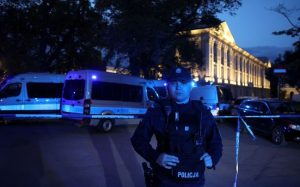Kenyan minister alleges intelligence agency behind his son’s abduction
3 min readKenyan Minister Claims Intelligence Agency Behind His Son’s Abduction
In a startling claim, Kenyan Minister of Public Service Justin Muturi has accused the country’s National Intelligence Service (NIS) of being responsible for the abduction of his son last year. Muturi’s allegations have sparked widespread controversy as criticism over the growing number of abductions in Kenya intensifies.
Muturi’s son, Leslie, was abducted on June 22 of the previous year. The minister’s statements to the police crime investigations unit revealed a disturbing timeline of his efforts to secure his son’s release. He explained that it took a personal intervention from President William Ruto to ensure his son’s release from the custody of NIS.
Muturi has become the first government official to publicly criticize the handling of abductions by the Kenyan government. In his statement, he described the difficulties he faced while trying to find his son, despite reaching out to several high-ranking government officials. He reported that the Directorate of Criminal Investigations (DCI) had advised him to file a statement but reassured him that the matter was still under investigation.
Over the past six months, at least 80 people, including Muturi’s son, have been abducted across Kenya, according to a report from a state-funded human rights group. The surge in abductions appears to be connected to the wave of protests against rising taxes that began in June and have continued since. While some victims have been freed following public pressure, many others remain missing, and answers have been scarce.
Muturi publicly lamented that despite his repeated attempts to contact top security officials—including the inspector-general of police, the interior minister, the DCI head, and the NIS director—he was met with no support. In a desperate move, he reached out to President Ruto directly. Muturi explained that he personally visited the President’s official residence to express his concerns and share details of his interactions with the unhelpful officials.
During this meeting, Muturi recounted the ordeal and his belief that NIS was holding his son. According to the minister, President Ruto made light of the situation initially but soon made a phone call to NIS Director Noordin Haji. In a revealing conversation, Ruto asked Haji if he was holding Leslie Muturi. Haji confirmed that he was, and President Ruto instructed Haji to release Leslie within the hour. The swift resolution came only after the president’s intervention.
Muturi’s public criticism of the government has not been well-received by some political allies. Certain government-affiliated politicians have called for his resignation, accusing him of undermining the administration by making such allegations. However, Muturi’s actions have also fueled public speculation about a possible rift within the government, with some ministers and officials continuing to deny that the state is involved in abductions.
The issue of abductions in Kenya has escalated, with foreign nationals also being targeted. Among the victims was prominent Tanzanian activist Maria Sarungi Tsehai, who was abducted by armed men but later released. Similarly, Ugandan opposition leader Kizza Besigye was kidnapped in Nairobi last year, allegedly by Ugandan security officials, and taken across the border for trial.
Muturi’s direct mention of President Ruto in the context of the abductions has drawn attention as it goes against the principle of collective responsibility in government. Critics argue that his public comments challenge the unity of the administration, as it implies a lack of control over security forces.
Amid the public outcry, President Ruto addressed the issue of abductions late last year, assuring the nation that the government would take steps to put an end to them. He also urged parents to instill good values in their children and cautioned young people against using social media to disrespect political leaders. Despite the president’s reassurances, the continued widespread criticism of the government, particularly on social media platforms, suggests that many remain unconvinced by official statements.
The situation in Kenya remains tense, as the government struggles to contain the wave of abductions and address concerns over the role of the intelligence agencies. As the issue continues to dominate public discourse, the government will likely face increasing pressure to provide transparency and accountability in its handling of these incidents.






